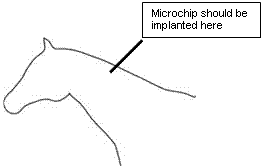 Effective September 1, 2019, all horses on the Gulfstream Park, Palm Meadows and Gulfstream Park West (Calder) grounds must be microchipped.
Effective September 1, 2019, all horses on the Gulfstream Park, Palm Meadows and Gulfstream Park West (Calder) grounds must be microchipped.
Microchips are a requirement of Jockey Club registration for Thoroughbreds foaled in 2017 and later.
For Thoroughbreds, the International Stud Book Committee (ISBC) has indicated that ISO 11784/11785-compliant microchips are to be inserted on the horse’s left side nuchal ligament.
If your horse has not yet been microchipped, Gulfstream’s track veterinarian Dr. Joe Zerilli will be performing the procedure during the next few weeks with the assistance of Gulfstream horse identifier Darrell Coe.
“We are doing chips barn by barn,” Coe explained. “Horses shipping in and out slow down that process.”
After Dr. Zerilli microchips a horse, a copy of its foal certificate edited with the new microchip number is sent to the Thoroughbred Racing and Protective Bureau, the State Veterinarian, the Gulfstream Park Test Barn and the Horse Identifier’s office.
An equine microchip is an RFID (Radio Frequency Identification) device that operates by receiving a radio wave signal from a microchip reader. The chip then transmits its number to the scanner. The interaction between the chip and scanner takes less than a second, allowing for quick identification.
The former lip tattoo system will be phased out by 2020, raising questions among Thoroughbred aftercare advocates about the ability to identify horses that may wind up in the custody of a dealer.
To read the answers to frequently asked questions about Thoroughbred microchip requirements from the Jockey Club, click here.
To access The Jockey Club’s online interactive registration portal, click here.



